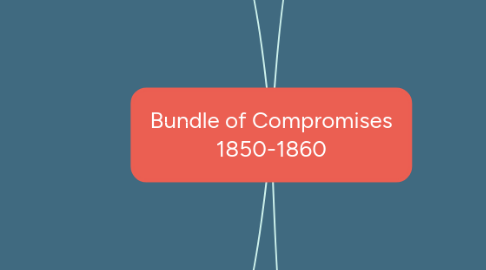
1. Kansas-Nebraska Act
1.1. Causes
1.1.1. Senator Douglas' new law to build a railroad and promote western settlement
1.1.1.1. Needed Southern approval
1.2. Debates
1.2.1. Expansion of Slavery
1.2.2. Sectionalism
1.3. Provisions
1.3.1. Split Nebraska Territory into Kansas-Nebraska and allowed each to vote on slavery
1.4. Results
1.4.1. Repealed Missouri Compromise
1.4.2. "Bleeding Kansas"
1.4.2.1. Conflicts between anti-slavery and pro-slavery forces exploded in Kansas
1.4.2.1.1. Sack of Lawrence: Pro-slavery forces attacked the free soil town of Lawrence, killing two and destroying the town
1.4.2.1.2. Pottawatomie Creek Massacres: John Brown and his sons attacked a pro-slavery farm settlement, killing five settlers
2. The Charles Sumner - Preston Brooks Affair
2.1. Preston Brooks assaulted Charles Sumner on the Senate Floor
2.1.1. Causes
2.1.1.1. Bleeding Kansas
2.1.1.2. Sumner's Criticism of pro-slavery violence in Kansas
2.1.1.3. Expansion of Slavery
2.1.1.4. Sectionalism
2.1.2. Results
2.1.2.1. Preston Brooks
2.1.2.1.1. Outraged Northern politicians
2.1.2.1.2. Gained fame in South Carolina
2.1.2.1.3. Re-elected to House Seat
2.1.2.2. Charles Sumner
2.1.2.2.1. Injuries kept him away from Senate
2.1.2.2.2. Re-elected to seat
3. Compromise of 1850
3.1. Causes
3.1.1. Gold Rush and influx of settlers to California
3.1.2. California's Constitution
3.2. Debates
3.2.1. Free States vs. Slave States
3.2.2. Secession
3.3. Provisions
3.3.1. Admit California to the Union as a free state
3.3.2. Divide Mexican territory into Utah and New Mexico and allow settlers in each to decide slavery issue by majority vote
3.3.3. Ban the slave trade in the District of Columbia
3.3.4. Adopt and enforce Fugitive Slave Law
3.4. Results
3.4.1. Preserved Union
3.4.2. Added to the North's political power
3.4.3. Certain parts, like the Fugitive Slave Law and popular sovereignty, heightened controversy
4. Ostend Manifesto
4.1. American diplomats, Soulé, Buchanan, and Mason, met in Ostend, Belgium, to investigate the possibility of getting Cuba from Spain. They threatened to take Cuba by force without authorization from the American government.
4.1.1. Causes
4.1.1.1. Southern slave owners interest in Spanish-held Cuba
4.1.1.2. Rebellion in Haiti instigated Spanish officials to consider emancipation
4.1.1.3. Manifest Destiny
4.1.2. Terms
4.1.2.1. Acquisition of Cuba from Spain for $120 million
4.1.3. Results
4.1.3.1. Repudiated by Franklin Pierce administration and by Secretary of State Marcy
4.1.3.2. Soulé reigned
4.1.3.3. Buchanan benefitted politically with Southern support for presidential candidacy
4.1.4. Criticism
4.1.4.1. Extremely negative reaction at home and abroad

